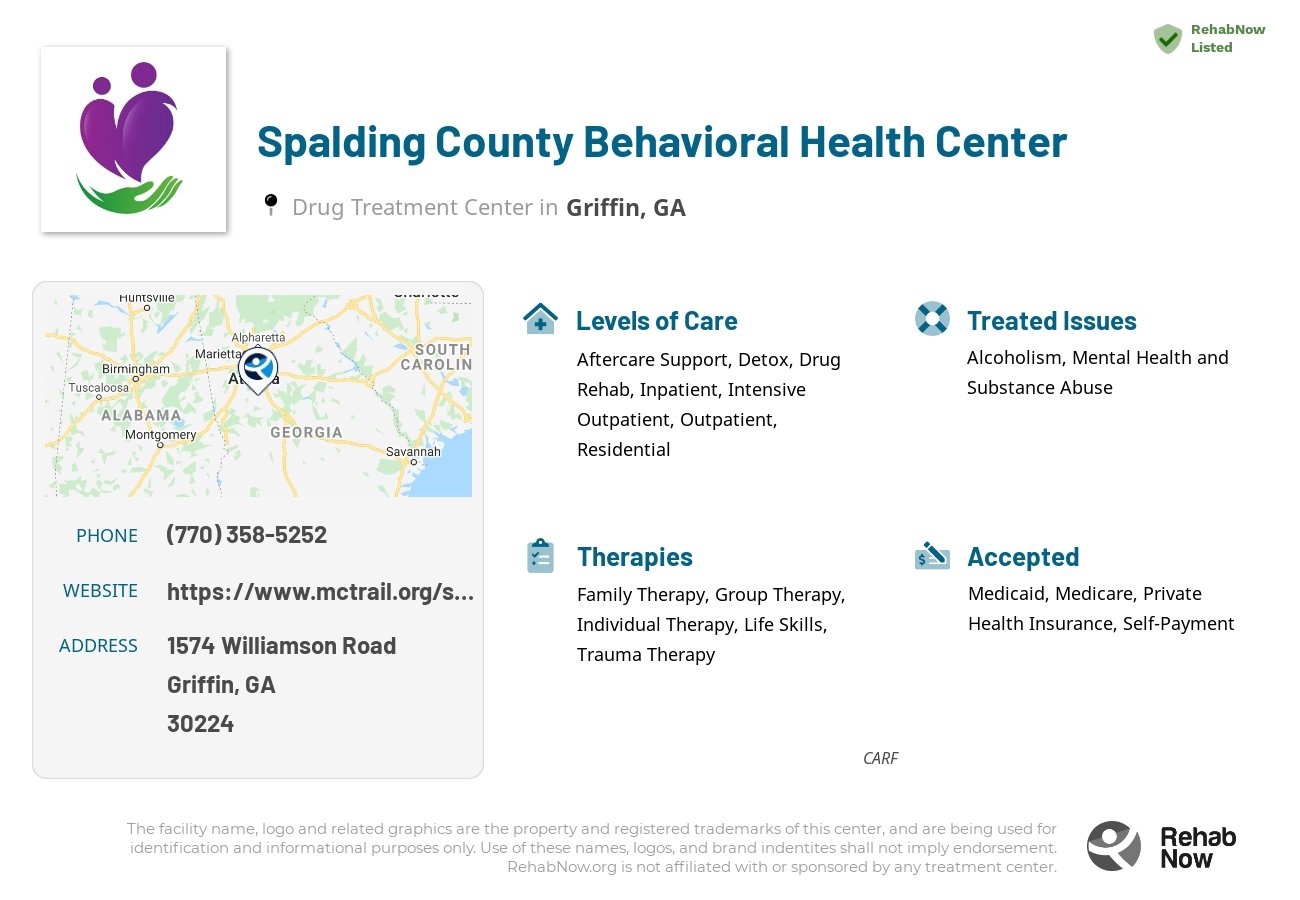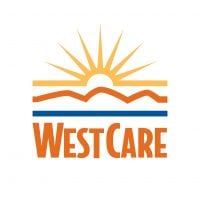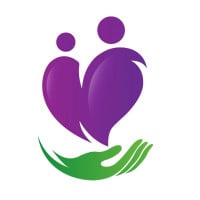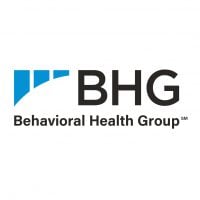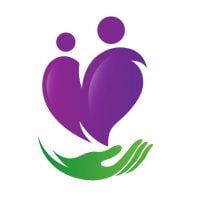
Spalding County Behavioral Health Center
Drug Rehab Center in Griffin, Georgia
- Dual Diagnosis
- Drug Addiction
- Alcoholism
Spalding County Behavioral Health Center in Griffin, Georgia provides comprehensive outpatient addiction and mental health treatment services, including evidence-based therapy, medication management, case management, vocational and educational assistance, health and wellness activities, and family support services.
About Spalding County Behavioral Health Center in Georgia
Spalding County Behavioral Health Center, established in 1993, is an Addiction Treatment Facility located in Griffin, GA. This center specializes in providing comprehensive treatment for individuals suffering from a range of addiction and mental health disorders. With a prime focus on alcoholism, dual diagnosis, drug addiction, opioid addiction, substance abuse, and mental health issues, Spalding County Behavioral Health Center offers a wide range of services to address and overcome these challenges. Accredited by CARF, the center ensures that its programs and services meet the highest standards of quality and effectiveness. Private health insurance is accepted, making treatment accessible for individuals seeking assistance.
Spalding County Behavioral Health Center provides an array of services to cater to the unique needs of those struggling with addiction and substance abuse. Their offerings include detoxification programs to help individuals safely and comfortably withdraw from substances, followed by comprehensive drug rehab programs that focus on addressing the root causes of addiction. For individuals requiring intensive treatment, the center offers inpatient and residential programs that provide a structured and supportive environment for recovery. Additionally, they provide outpatient and intensive outpatient services to individuals who may not require round-the-clock care but still need ongoing support and treatment. Aftercare support is also available to help individuals maintain sobriety and successfully transition back into their daily lives.
Genders
Ages
Modality
Additional
Accreditations

CARF
The Commission on Accreditation of Rehabilitation Facilities (CARF) is a non-profit organization that specifically accredits rehab organizations. Founded in 1966, CARF's, mission is to help service providers like rehab facilities maintain high standards of care.
Conditions and Issues Treated
Levels of Care Offered
This center offers a variety of custom treatment tailored to individual recovery. Currently available are Aftercare Support, Detox, Drug Rehab, Inpatient, Intensive Outpatient, Outpatient, Residential, with additional therapies available as listed below.
Detox is the stage of recovery where the drugs or alcohol are entirely removed from your body. There are two different ways to detox, with medications and without. For many drugs and alcohol, the acute phase of detox can be completed in a number of days.
Inpatient recovery offers individual therapy, groups, and family therapy. The length of inpatient addiction treatment depends on the addict and their addiction. Inpatient rehab is a costly drug treatment, costing anywhere from $30k- to $60k. However, insurance often offers help in covering these costs.
An intensive outpatient treatment program, or IOP, is set up for those struggling with an addiction to begin the recovery process. However, the patient will not live at the facility during treatment.
IOP involves patients coming in and out of a medical office building regularly to receive therapy and other services while continuing their life outside of these visits.
IOP is a step up from drug detoxification or alcohol detox. However, it’s still considered a phase of recovery rather than the ultimate goal. There are many rehabs and treatment facilities available to patients in need of IOP.
Outpatient treatment can be considered the lowest intensity level of addiction treatment in Griffin, GA. It is ideal for early phase addiction or lower intensity addictions. Spalding County Behavioral Health Center peer group support, 12-step programs, and individual counseling are likely to be involved.
Residential treatment programs are those that offer housing and meals in addition to substance abuse treatment. Rehab facilities that offer residential treatment allow patients to focus solely on recovery, in an environment totally separate from their lives. Some rehab centers specialize in short-term residential treatment (a few days to a week or two), while others solely provide treatment on a long-term basis (several weeks to months). Some offer both, and tailor treatment to the patient’s individual requirements.
Aftercare support is vital to those who have completed a drug or alcohol treatment program. This support comes in individual and family counseling, treatment of psychiatric and other medical conditions, and medications to reduce cravings. It helps recovering addicts adjust to normal day-to-day activities and can last for a year or longer.
The majority of drug and alcohol addicts who receive aftercare treatment do not relapse. It is estimated that without aftercare, the relapse rate will be between 70 to 90 percent for most people. Aftercare is the final stage in addiction recovery, but it will also help maintain sobriety if relapse does occur.
Therapies & Programs
Individual therapy is ideal for addicts who want to focus on themselves. It can also be helpful for those whose withdrawal symptoms are exacerbated by the presence of other people.
Benefits of individual therapy are:
- Access to a personalized treatment plan that focuses on the individual needs of the addict
- More privacy during treatment sessions
- Better personal development through introspection
- Increased self-awareness regarding addictive tendencies in order to avoid relapse
- Greater potential for a long-term recovery plan
- Receiving professional advice and detox assistance from medical staff
Family therapy can help you and your family deal with old issues that may trigger substance abuse. The idea behind family therapy for drug addiction is that you are never fully healed from substance abuse until you’ve healed your relationship with your family, too. To get sober, you need to find a different way to cope with the pain in your life.
This is when a group of people in various stages of recovery meet up and discuss their experiences, triggers, successes, failures, and even alternative therapies! Unlike support groups where everyone already knows each other, group therapy is conducted along side outpatient or inpatient treatment at Spalding County Behavioral Health Center.
Trauma therapy is a clinical process that helps individuals deal with mental stress often caused by traumatic events. The therapist helps the person identify, understand and work through the problem. This is done with the help of talking about it in group or one-on-one counseling sessions.
Therapists use relaxation, role-playing, art, and music to help the person open up about what is bothering them. Some examples include:
- Talking about the traumatic event and how it affected them.
- Helping those who have PTSD to deal with their nightmares and recurring memories.
- Working with individuals to resolve the issues triggering the stress, whether seeing someone who reminds them of what happened or feeling helpless.
The individual is also encouraged to help others that are struggling with similar problems. This often helps them feel empowered and gives them hope.
Trauma therapy is not for everyone; it is usually reserved for people who have recently experienced a traumatic event and struggle to get over it. It is generally done for children, teenage victims of sexual assault, and war veterans.
Those struggling with addiction can benefit from learning certain life skills. It is not as simple as quitting drinking or taking drugs and thinking that the hard part is over. Being sober means living a whole new way of life. Many recovering addicts have found that they need to develop talents like time management, organization, communication skills, socialization skills, and self-esteem to make their life in sobriety work, Spalding County Behavioral Health Center is here to help with that.
Payment Options Accepted
For specific insurance or payment methods please contact us.
Is your insurance accepted?
Ask an expert, call (888) 674-0062
Additional Details
Specifics, location, and helpful extra information.
Griffin, Georgia 30224 Phone Number(770) 358-5252 Meta DetailsUpdated November 25, 2023
Staff Verified
Spalding County Behavioral Health Center Patient Reviews
There are no reviews yet. Be the first one to write one.
Griffin, Georgia Addiction Information
Prescription opioid use has caused a large increase in the total amount of overdoses in Georgia. Almost 12% of the Georgia population uses illicit drugs each year, and slightly over 3.5% also abuses alcohol at the same time. This does not include those who binge-drink at least once a month, which includes 20% of all Georgians.
The drug use issue in Griffin, Georgia is quite serious. According to the National Institute on Drug Abuse, there were 672 drug overdose deaths in Griffin in 2016. This means that the opioid addiction problem in Griffin, Georgia is especially severe. Among adults aged 18 to 25 in Griffin, 9.4% had used illicit drugs in the past month. Some of the most common treatments include inpatient rehab, outpatient rehab, and 12-step programs.
Treatment in Nearby Cities
- Stockbridge, GA (22.3 mi.)
- Rincon, GA (189.3 mi.)
- Sylvania, GA (157.7 mi.)
- Nahunta, GA (194.7 mi.)
- Cuthbert, GA (104.7 mi.)
Centers near Spalding County Behavioral Health Center
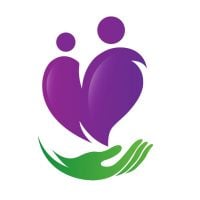


The facility name, logo and brand are the property and registered trademarks of Spalding County Behavioral Health Center, and are being used for identification and informational purposes only. Use of these names, logos and brands shall not imply endorsement. RehabNow.org is not affiliated with or sponsored by Spalding County Behavioral Health Center.


